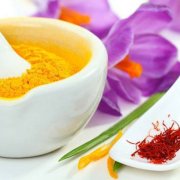Use of Saffron
 Recipes with saffron can be found In the delicious cuisine of the Occident from the oriental cuisine to the flavorful cuisine of the Mediterranean.
Recipes with saffron can be found In the delicious cuisine of the Occident from the oriental cuisine to the flavorful cuisine of the Mediterranean.
With its flavor and prominent yellow color, it refines many dishes. Already a small amount that fits on the tip of a knife is enough to make a dish tasty for a sophisticated palate.
Besides the use in fish, meat, stews, broth, noodles, and potatoes, the spice is also used in sweet desserts. There are no boundaries for the culinary fantasy whether it is used in puddings, sauces or in semolina pudding, milk soup or milk rice.
Gourmets meanwhile value saffron as an excellent ingredient in liquors and as a supplement to exclusive cocktails.
Saffron is not only a spice with an incredible flavor and taste, but also possesses an extraordinary characteristic, which furthers our health and supplies our body with considerable amounts of nutrients. Measured by an ounce (28 grams), saffron possesses a content of manganese of 250 percent of the daily dosage. Further, this spice is an important source for vitamins of the groups A, D, C, B1, B2, B3, B6, and B12 as well as for minerals like magnesium, iron, phosphor, potassium, calcium and zinc. Further, saffron contains more than 150 micronutrients, among others Picrocrocin, which is responsible for the strong taste, and Safranal for the characteristic fragrance of the precious spice.
Saffron possesses multiple therapeutic characteristics, which have been verified by scientists. Already hundreds of years ago, the spice was used to treat different illnesses and complaints. Saffron possesses pain reducing characteristics as well as a diuretic and diaphoretic effect. Additionally, saffron is being administered in case of epileptic seizures and as a heart remedy. Further, the spice is suitable as a restorative for the stomach and is effectively used against loss of appetite. Saffron also helps in improving the mood and in reducing stress, anxiety, and depressions. The bittern, it contains, is effective against complaints of the liver and severe coughing.
According to the newest research results, the spice can also be used as a remedy against the formation of cancer. In many test models, it has been shown that the extract of saffron reduces or delays the growth of tumors. Similar tests showed this result in the case of skin cancer and in tests with mice. In other studies, it was revealed that symptoms like memory loss and neurological disturbances can be curtailed.
In spite of all positive effects and the proven healing effects, the consumption of large amounts of saffron can induce a toxic effect on the body and lead to adverse effects. For this reason, no more than 1.5 grams should be consumed per day. During pregnancy, the consumption of saffron should be avoided.

